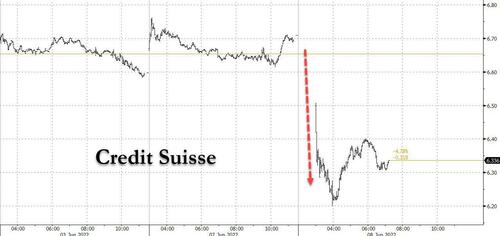Credit Suisse Plunges After Warning Of Q2 Loss, Sees New Round Of Job Cuts
Yesterday it was Target (again), today it's one of Europe's largest banks: it is safe to say that our observation that "guidance cut" season has started was spot on.
guidance cut season has officially started
— zerohedge (@zerohedge) June 2, 2022
On Wednesday morning, Credit Suisse (CSGKF) joined the giant US retailer in issuing its third profit warning since January, when it warned that it would probably report a loss in the second quarter as its investment banking division was hit by market volatility from the war in Ukraine, the tapering of pandemic stimulus measures and monetary tightening in response to rising global inflation. Against that backdrop, the bank said it had suffered from “weak customer flows and ongoing client deleveraging, notably in the [Asia-Pacific] region”.
This was the bank's third warning in 2022: in January, Credit Suisse warned it would report a loss for the final quarter of 2021 on the back of a slowdown in revenues at its investment bank. Three months later, it announced that it expected a first-quarter loss due to an increase in legal provisions.
The group’s investment banking division also struggled in April and May because of low equity and debt issuance and widening credit spreads as countries around the world tightened monetary policy. Revenues at investment banks across the board are down significantly from record levels last year and many are preparing for staff reductions, according to analysts.
The second biggest Swiss bank also added that it will accelerate cost-cutting measures, as market volatility pushes back the prospect of a recovery for a bank beset by crises in recent years. Executives also braced for a potential round of job cuts and a freeze on hiring in the group’s investment bank in the second half of the year along with other competitors, according to people with knowledge of the planning.
“Given the economic and market environment, we are accelerating our cost initiatives across the Group with the aim of maximizing savings from 2023 onwards,” Credit Suisse said, without providing more details.
“The main culprit is once again the investment bank, where Credit Suisse expects the fourth quarterly loss over the last six quarters,” said Vontobel analyst Andreas Venditti.
“As a consequence, Credit Suisse announces an acceleration of its cost [cutting] initiatives. Similarly to cost measures executed in the past, the consequence is likely to be a further erosion in staff morale and therefore another negative impact on revenues.”
In an interview with Bloomberg on Tuesday, Credit Suisse’s global head of investment banking and capital markets David Miller said: “I’ve been using the entire first five months of this year running around seeing clients and telling them we are back.”
But other senior managers were preparing for a reduction in the bank’s headcount later this year should conditions fail to improve, according to people with knowledge of the matter. The plans include laying off underperformers, not replacing departing staff and hiring fewer graduates.
The bank is due to publish its second-quarter results on July 27, while chief executive Thomas Gottstein will provide a trading update on Thursday at a Goldman Sachs event. The bank announced an overhaul of top executive roles in April after posting a loss in the first quarter as it sought to move on from a succession of recent crises.
“As we look forward to the second half, the year 2022 will remain one of transition for Credit Suisse,” the bank said on Wednesday. “Given the economic and market environment, we are accelerating our cost initiatives across the group with the aim of maximising savings from 2023 onwards.”
Shares tumbled as much as 6.3%, to an almost one-month low, and taking their decline for the year to 30 per cent.
RBC said that weakness in businesses outside of investment banking was the biggest disappointment. Peers dropped, with Deutsche Bank down 2.7% and UBS down 2.3%. Here’s what analysts had to say:
JPMorgan analyst Kian Abouhossein (underweight) said that Credit Suisse’s warning for 2Q was expected based on peer commentary and Dealogic data, yet the pre-announcement is still worse than expected
- Markets revenue performance is likely to be worse than peers due to the weaker performing credit businesses
- Abouhossein notes that 2022 will be a year of transition for Credit Suisse, with accelerating cost initiatives across the bank that aim to maximize savings from 2023 onward
- Says weaker customer flows and ongoing client deleveraging -- notably in the APAC region -- provide a negative read across for
UBS and Baer
- RBC analyst Anke Reingen (sector perform) notes that while weak performance in the investment bank is not unexpected, weakness in other parts of the business, especially wealth management, is more disappointing
- Says the report shows how challenging it is for Credit Suisse to improve its operating performance in the current environment
- Notes that further cost saving measures are positive but will take time to show effect
Disclosure: Copyright ©2009-2022 ZeroHedge.com/ABC Media, LTD; All Rights Reserved. Zero Hedge is intended for Mature Audiences. Familiarize yourself with our legal and use policies every ...
more




